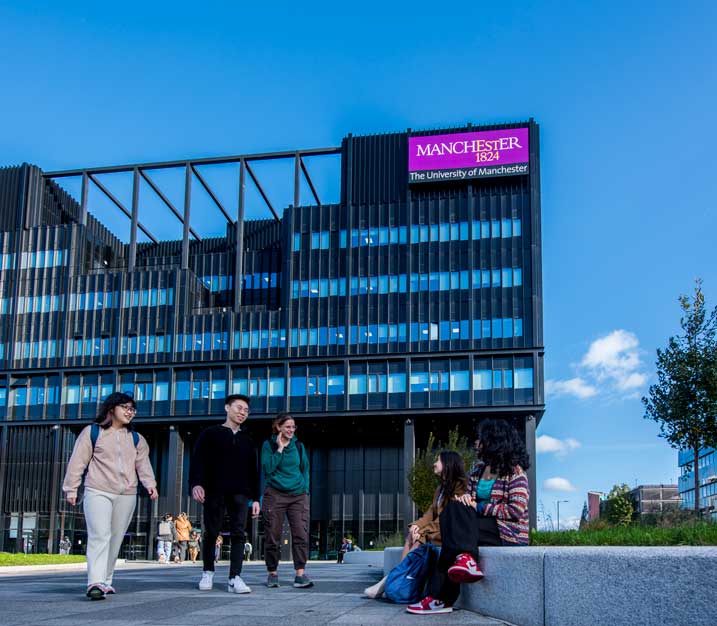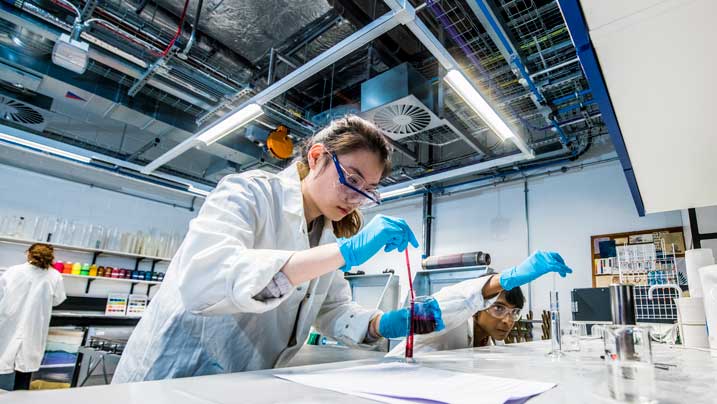Why an MSc in Materials Science
Transforming everyday life through materials
Materials are at the heart of everything – from the clothes we wear to the infrastructure we rely on. A small change in a material’s properties can dramatically improve a product’s functionality, efficiency, or sustainability. From healthcare to energy, materials scientists lead innovations that both improve people’s daily lives and tackle challenges on a global scale.
Becoming an expert and leader in a field like materials science that spans every science and engineering discipline gives you the opportunity to make a tangible difference. Materials really do matter – and so will the impact you make.
Master's courses
MSc Materials Science
- MSc Advanced Engineering Materials:
Explore the technologies used in the manufacturing and processing of advanced materials and learn the relationships between composition, microstructure, processing and performance. - MSc Biomaterials:
This course is the ideal preparation for a career either in industry as a biomaterial scientist, or for cutting-edge academic research in clinical applications. - MSc Materials Engineering for Sustainability in Demanding Environments:
Gain the expertise to tackle material degradation in extreme environments, developing sustainable solutions that improve safety, reliability and environmental performance across sectors such as clean energy, transport and healthcare.
- MSc Nanomaterials:
This exciting new MSc provides research-focused teaching and training for graduates wishing to develop a career in the cutting-edge, dynamic field of nano and functional materials. - MSc Polymer Science and Engineering:
Study this multidisciplinary course and gain a rich understanding of the chemistry, properties, processing, characterisation and application of polymers and be at the forefront of sustainable solutions. - MSc Textiles Technology:
Study this MSc and develop a high level of understanding of modern textiles, preparing you for a career in the textile technology or related industries.
Why Manchester
Join a world-leading hub for materials innovation
Join one of Europe’s largest and most ambitious hubs for materials research and teaching – right here at Manchester.
- We're home to the National Graphene Institute, the Henry Royce Institute and the Graphene Engineering Innovation Centre and are ranked 4th in the UK and 21st globally for Materials Science.
- Our interdisciplinary expertise prepares you to tackle real-world challenges and shape the future of materials innovation.
- All our MSc courses are accredited by the Engineering Council and the Institute of Materials, Minerals and Mining.

Where do our graduates go
Industry
Our graduates are in demand in a wide range of industries, going on to work with leading organisations such as Airbus D & S, Nestlé, BP, Johnson Matthey, Saudi Aramco, UBS Investment Bank, and the UK’s National Nuclear Laboratories.
Whatever sector you’re in whether it’s aerospace, energy or manufacturing, employers value the depth of knowledge and practical experience our graduates bring.

Research
Many of our MSc graduates also choose to continue into research, using their time at Manchester as a springboard into PhD study or technical research roles.
With access to world-leading facilities and teaching informed by pioneering research, your master’s will prepare you to contribute to meaningful and innovative research.

Variety of roles
Wherever you’re heading, your MSc gives you a platform to shape a career that suits your goals. Our graduates take up diverse roles such as project managers, materials consultants, senior engineers, sales consultants, and technical officers. Others apply their knowledge in sectors as varied as healthcare, defence, sustainability, and fashion technology.
With Manchester’s strong industry links and global reputation, you’ll be well positioned to thrive wherever you choose to go next.

How you will learn
Teaching
Teaching is delivered in a variety of ways to ensure students have a rich and well-rounded learning experience. In a typical week you’ll have a mix of in person lectures, small group tutorials, laboratory sessions as well as some online teaching.

Research and self-study
Outside of your timetabled teaching time, you’ll also undertake group work, individual preparatory or set work, as well as any additional reading or research required from lectures. You’d be expected to spend approximately 30 hours of self-study time per week.

Dissertation project
As part of your master’s degree, you may need to complete a final project where you'll conduct a piece of empirical research that addresses a specific research question in a field related to your course. This may incorporate laboratory or field/workplace-based investigation, data handling or a systematic review.

MSc projects
Examples of current and past projects
Take a look at a few examples of research projects our MSc students have completed as part of their final dissertation:
- Additive Manufacturing of Functionally Graded Ceramics for Thermal Barrier Coatings
- In Vitro Bone Model for Assessing Tumour Metastasis
- Mechanisms of Material Degradation in Aggressive Media: Development of Self-Healing Coatings for Infrastructure and Energy Applications
- Gradient Core-Shell Nanocomposites for Solid-State Lithium Batteries
- PET Circularity: An Integrated Approach for Sustainable Recycling
- Effects of Wicking of Graphene Oxide Dispersion on Electric Conductivity of yarns.
How to apply
Apply for our Materials Science MSc courses
If you’re interested in applying to the taught master's at Manchester, here’s what you need to know.
Contact us
Have any questions? Get in touch
Materials Science enquiries
